Bradley Cooper’s ‘Maestro’ Explores The Powerful Bond Between Musical Genius Leonard Bernstein And His Wife Felicia: “This Had To Be A Story About Their Relationship”
- Oops!Something went wrong.Please try again later.
- Oops!Something went wrong.Please try again later.
- Oops!Something went wrong.Please try again later.
- Oops!Something went wrong.Please try again later.
- Oops!Something went wrong.Please try again later.
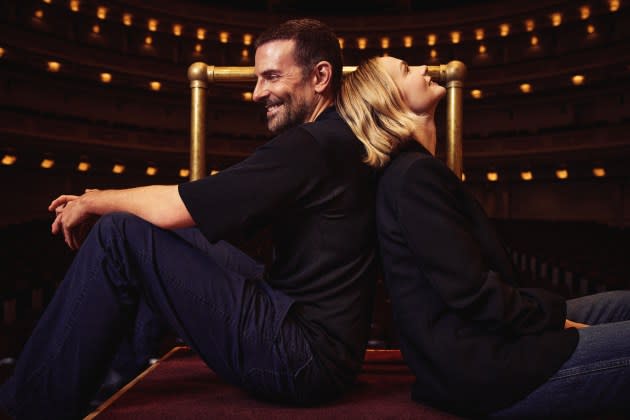
Leonard Bernstein — the composer of West Side Story and considered one of the world’s greatest conductors — has lived rent-free in Bradley Cooper’s head since 2018, when Steven Spielberg met with him about what was going to be a straightforward biopic of a musical genius. Somehow, Spielberg knew that Cooper had been obsessed with conducting since he was a child. Not because he was some kind of musical prodigy, but because of an episode of The Bugs Bunny Show in which the hero conducts the London Philharmonic Orchestra at the Hollywood Bowl, arms flailing wildly.
“Growing up, there was always classical music playing in the house,” Cooper recalls. “So, because of the cartoons I was watching, I used to wave my hands about and pretend that I was creating the music that I was hearing. One Christmas I asked Santa, and all of a sudden I had a baton that I was able to wield.”
More from Deadline
He spent hundreds of hours waving his arms, conducting, just like Bugs. “So, I always knew that, in a way, I’ve been prepping this character since I was little. I guess it was the same thing with my last movie, A Star is Born: I’d been playing air guitar since I was a kid.”
Spielberg elected not to advance with the project, but when he reached that conclusion, Cooper, who’d initially known nothing about the composer and conductor other than “what he looked like and that he was an icon,” was already hooked. The timing was perfect: having just finished A Star is Born with Lady Gaga, he’d come to realize something about himself: “What I really love is to write and direct movies and spend a lot of time on a piece of art.”
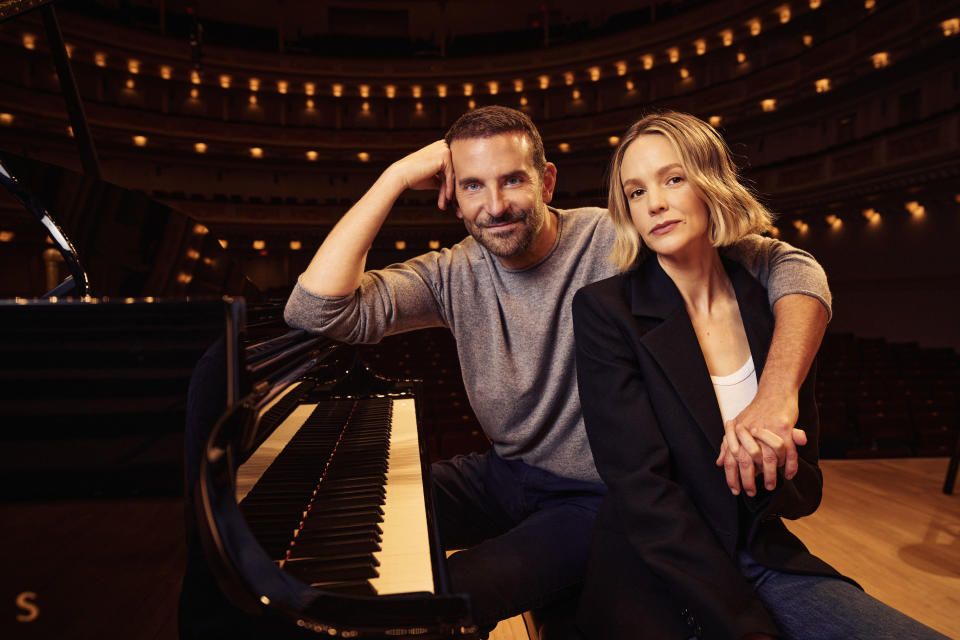
It was with some trepidation, then, that he went to Spielberg and asked, “Would you consider giving me this project?” On seeing an early cut of A Star is Born, Spielberg willingly handed over the reins. “If you can get the rights to the music,” he warned, “because they’re about to lapse.”
That was a fact Cooper hadn’t been aware of, so he arranged to meet the “the Bernstein kids,” as he calls them, in New York, having recently moved there. He screened A Star is Born for them, and he shared his enthusiasm and curiosity about their dad with them. “Luckily, they went with us. And that’s when it began. Lenny just sort of took hold of me.”
The movie was born in the research. Poring over their correspondence, private papers, home movies and the like, Cooper discovered so much more about Lenny. As the classical music world knew very well, Leonard Bernstein was bisexual, and continued having homosexual affairs throughout his marriage to Felicia Montealegre, a classically trained actress. But this was not a marriage of convenience; it was a partnership of equals, albeit one that suffered bitter ups and downs. So, Cooper went back to the Bernstein kids and informed them that this was going to be no ordinary biopic. “In order to make a movie,” he told them, “there has to be something else. And I think that what moves me in your father’s story is the relationship between your parents.”
“That really stunned them,” Cooper says. “They didn’t quite believe I was actually going to focus on their mother too. But that’s all I was interested in.”
Not quite all, though, because there was always going to be a focus on Bernstein’s music, which he considers to be another major character in the story. “I always thought, ‘This has to be symphonic — the film itself, in its structure — and it’s got to be sympathetic to his music.’ I mean, what better way to show his impact than to play his music?”
Cooper immediately dove into Felicia’s life, listening to recordings of her radio shows and appearances on television. Her top billing over Charlton Heston in a 1949 live TV version of W. Somerset Maugham’s Of Human Bondage especially intrigued him when he realized that, at that time, she was a bigger star than her future husband.
Cooper didn’t have anyone earmarked for the role of Felicia. He’d known Carey Mulligan for a while, but mostly from the circuit. He thinks they might have met for the first time in around 2009, possibly at the Council of Fashion Designers of America Fashion Awards. Mulligan was just starting out, garnering accolades — including a best actress BAFTA win and her first Academy Award nomination — for her breakthrough role in An Education. Over the years they saw each other around and about, and though he was, he confesses, “a huge fan of her work,” that was all.
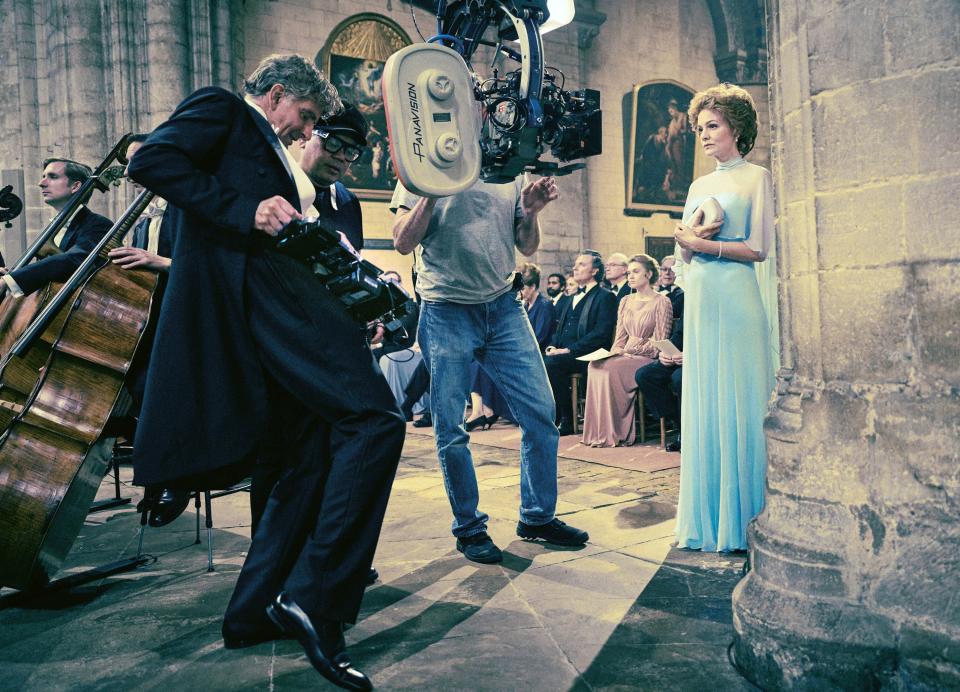
As Cooper continued with his research, hearing Felicia’s voice in audio tapes and seeing her face in movies and photographs, he began to develop a stronger idea of the actor he needed. “Carey just kept coming into my head,” he says. So, he reached out to a mutual friend and wondered whether Mulligan would ever be open to talk.
“The friend said, ‘Well, she’s in New York. She’s doing a play.’ I was like, ‘When?” And it was the following week. So I went, and I was sitting in the audience…”
He beams. Clearly, the memory is as fresh as the day it happened. “It’s a one-woman show, and it starts with a spotlight that shines right on the character. For some reason she happened to have blonde hair at that time and, for much of her life, Felicia had blond hair. And she was wearing it up, literally, like Felicia. It was as if Lenny and Felicia were saying to me, ‘Come on, what more do we have to tell you?!’ I got the chills. It was Felicia who came right out onto the stage. Then she started to talk, and I was like, ‘I have to talk to her about this.’”
When the play was over, he leapt from his seat and raced backstage to Mulligan’s tiny dressing room — only to find the actor lying on the floor, sobbing.
In music terms, you could say it was a drammatico moment. Mulligan knew Cooper would be coming to see her at some point during her five-week run in the summer of 2018, performing Dennis Kelly’s monologue Girls & Boys at the Off Broadway Minetta Lane Theatre in Greenwich Village. But she didn’t know exactly when. “And then he had to come on the first preview, which is always when you want people to come and see your work. The very first time,” she recalls, a little sarcastically, but with a smile.
What Cooper was about to find out, as he headed backstage, was that a piece of the set had struck Mulligan on the head during a set change that takes place in the dark. “I didn’t know that,” he recalls. “And they said, ‘Well, she’s lying prone on the floor, but just wait a second.’ She was in really dire straits, not doing well.”
Mulligan winces at the memory. “The wooden frame of the set hit me on the head, and it sort of dazed me. I mean, it really, really hurt. But no one saw it happen, because it happened in the blackout.”
Like the trouper she is, she carried on. “But when I walked off stage, I suddenly felt like I was going to faint. I was panicking. I was having a massive panic, thinking that I was in real trouble. I mean, you know what can happen with head injuries. It hurt so much, I was crying on the floor in my dressing room.”
And then in walks Bradley Cooper.
“He came in and saw the state of me, and he was like, ‘Right we’re off to hospital.’ So off we went to the hospital, much to the delight of the nurses who worked there.”
But although the actress was happy that Cooper had come to her aid, she was entirely clueless as to why he’d come. And Cooper didn’t even have anything he could show her; at the time, the film was almost entirely in his head. “There was no script, there was nothing,” he says. “All I knew was that it was going to be about the two of them.”
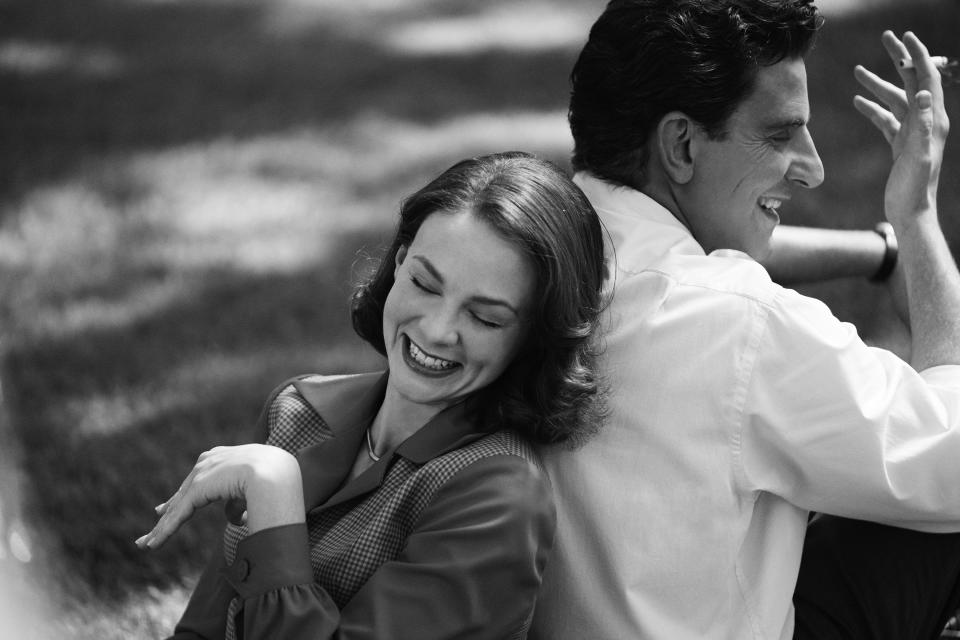
Mulligan interrupts. “He said, ‘I want to make a film about marriage.’”
But, for a short time, conversation had to wait. Not long after that fateful night, they met again for breakfast at Cafe Cluny in the West Village. “I just sort of shared my thoughts and feelings about this project,” says Cooper. “It was something that I thought could be really life-changing for both of us, if she was willing to put the work in.”
He asked her to listen to “Make Our Garden Grow,” the closing number from Bernstein’s opera Candide. It’s a song about young lovers understanding the imperfection of life and the need to face it head on. The aria was pertinent because it points somewhat toward how the composer and the actress understood clearly (or at least Felicia did), what they needed to face head on. In letters that the couple’s three children — Nina, Jamie and Alexander — donated to the Leonard Bernstein Collection at the Library of Congress, Felicia makes it clear that she understood her husband’s complicated sexual identity (“If your peace of mind, your health, your whole nervous system depend on a certain sexual pattern, what can you do?” she asked, rhetorically). As a result, she gave Bernstein permission to indulge his “double life.” as she put it, but discretion was key, and the movie is underpinned with that delicate level of understanding.
A week after that, Cooper asked Mulligan if she wanted to come to Philadelphia and work for free, narrating Candide with Yannick Nézet-Séguin, who was going to conduct it. “And she said, ‘Yeah.’ Straight away. I was like, ‘You do know it’s for free? We’re not getting paid!’
He laughs. “But she came anyway, and spent five days in Philadelphia, doing three performances. And it was wonderful. That was the beginning of us, brick by brick, becoming closer. Because we’d only known each other on the periphery. But she was willing to go deeper and deeper, and I asked so much of her. I asked as much of her as I asked of myself.”
They did an intensive six-day workshop, or rather, what they refer to as a “dream workshop” — a one-person show for each other — just the two of them, no cameras, in his apartment in Tribeca. It included an interrogation of their own lives revealed in a ritual they performed in front of each other “based on our dreams and work on our character. It’s really kind of a beautiful thing, but it’s scary. I saw her bare her soul for Felicia and for me. And she made me feel safe enough that I could do the same for her.”
At the end of that exercise, he knew, as a filmmaker, that they could pull this off.
“And that was it,” Mulligan adds gleefully.
***
When we meet, Cooper and Mulligan are sitting side-by-side in a hideaway suite at the Sunset Tower on Sunset Boulevard. Both listening, waiting their turn with a grace that’s lost on the younger wannabes who want their turn now — right now. To reach this level of artistry doesn’t just happen by chance: both have honed and refined their craft. I have watched both be brave enough to tread the boards, she perhaps more than him, in back-breaking work by playwrights both famous and obscure. It’s as if she was suspicious of that early acclaim for An Education and had — or needed — to prove that it wasn’t a fluke.
But it definitely wasn’t a fluke. That was evident in Mulligan’s early screen appearances; as Ada Carstone in the 15-part Bleak House the BBC aired in 2005, and her Kitty Bennett in the Pride & Prejudice movie released the same year.
The first time she performed at the Royal Court in London’s Sloane Square was in 2004, in director Katie Mitchell’s production of Kevin Elyot’s Forty Winks. Mulligan excelled playing a possibly abused, narcoleptic teenager. My own battered copy of the play text, which I still have at home, is annotated with the words “Must find out what she’s doing next. Future star?” Well, yes.
If An Education gave notice, then her Nina opposite Kristin Scott Thomas and Chiwetel Ejiofor in director Ian Rickson’s memorable 2007 production of Chekhov’s The Seagull, also at the Royal Court, yelled out that Mulligan had arrived. Scott Thomas led the company to Broadway where critics did cartwheels.

That’s why Cooper’s comment about her being prepared to put in the work to portray Felicia surprised me, slightly, because the evidence suggests she has always been prepared to put in the work, which has always been evident to those who have followed her. Mulligan insists, however, that “I’ve never worked like this before.”
What does she mean by that? “First of all, I’ve never been as prepared, probably, as I was [to play Felicia]. And I did that because I knew that I had to live up to the real privilege of being asked to do it by him, and to honor the family as well. But, largely, he had invested so much of his life into this epic that I didn’t want to, frankly, f*ck it up for him.”
“I mean, it’s about a marriage. It’s about the two of them. So, if I’d gone in there and not delivered, I would’ve been letting everybody down. It would’ve been a complete imbalance. It wouldn’t have worked. So, I did the work.”
Her interpretation of what they refer to as the “dream workshop” is similar to Cooper’s, although one senses it was tougher for her than it was for him. “It was genuinely soul-baring stuff,” she remembers. “It was deeply, deeply personal. But by the end of the week, I felt that there was nothing I could do that could be wrong or embarrassing. I think the biggest gift a director can give you is the feeling that you can’t fail, that you’ve got complete and utter support. That’s not to say you get a free pass, just that all of your slightest instincts you’re allowed to play on. You don’t need to have inhibitions; you don’t need to be self-aware.”
As a result, the performance flowed organically. “Very early on into filming, I realized I just wasn’t thinking, and didn’t have to think, because I’d put the work in.” And when the two of them were acting together, she notes, “even less thought was required.”
She explains a little further. “To be directed by an actor that is living and breathing his character just takes all of the effort out of it. You look and you see Leonard Bernstein. There was just so much faith and trust in between us.”
Cooper agrees. “It didn’t feel like acting. It wasn’t acting, I have to say. I know that sounds like…” He laughs. “I don’t know what that sounds like! But it did not feel like acting. We’d get to set, and I’d tell her everything that was going to be in the shot, the way everything was going to be. Nothing was ever forced [on her]. And anything that I felt was hard going for her, I knew about, because I knew it was also hard for Felicia.”
Through the workshop and all the rehearsals, Mulligan began to see, quite clearly, that Felicia was more than just a spouse. “I mean, there’s nothing interesting to me about playing the wife of a great man,” she says, her eyes narrowing. “The script was so clear about who she was. And from the very beginning there was this idea of what it’s like to be in close proximity to greatness, and what that means for someone who is also an artist. If she’d been a lawyer or if she didn’t have career ambitions at all, it would be a different story. But here you have two artists who fall in love and spend their lives together. One of them is touched by god and the other is an artist. There was a moment where she was more famous than him, but they fell in love as soon as she met him.”
Mulligan feels that Felicia’s tactics for dealing with Bernstein’s behavior would’ve changed a lot over the years, as Bernstein’s philandering lifestyle became more overt. “But she was adamant — from all the recordings that we heard, and from everyone who knew her — that she was never a victim. That was not her. She refused to be a victim.”

She notes that, often, when the couple were backstage at shows, Lenny would be lauded by ladies falling over themselves to get into his dressing room. Felicia, meanwhile, would just sit in the corner and chain-smoke. “It was always Lenny and Felicia, always unsolicited. That’s how it was spoken about, the two of them, two alphas, two worthy adversaries. So that was always clear. The reason why I wanted to make this movie is that it’s not about this deceitful husband and the victim wife. He doesn’t lie. He is exactly the same person. He doesn’t change, actually. He’s the antagonist. She’s the protagonist. She’s the one who sort of comes to this realization about how she’s lived her life and who she is and what her choices really have meant to her.”
Mulligan cites tapes of Felicia and Lenny where they’re talking about their relationship and how they communicate. “And the interviewer says, ‘Do you tell each other everything?’ And she says, ‘If there’s something that needs to be said, then we say it.’ I think it was a roundabout way of saying, ‘If there’s stuff out there about our relationship or relationships with other people that has to be confronted, then we will confront it.’ ”
She mentions a moment in Maestro when, after the triumph of the first performance of Bernstein and Stephen Schwartz’s huge dramatic pageant “Mass,” a piece that Felicia had championed and encouraged as he labored to complete it, the person he goes to for comfort is not Felicia. He takes his close friend’s hand and not hers.
“That’s the betrayal,” says Mulligan. “That’s a heartbreak, because until that moment, she had been that comfort, and that was everything to her. But suddenly he’s taking someone else’s hand for reassurance.”
And that’s the moment where Mulligan nails it. Nails the performance. Nails the movie.
Cooper concurs, and says that when he and Spielberg were talking about it, Spielberg had said, “Well, she made Lenny her art. That’s exactly right. In that scene, she’s saying, ‘This is my art.’ It’s killing her.”
***
When I lived in New York in the early 1980s there came an invitation to Bernstein’s apartment at the Dakota for a reception for a music charity. On arrival, I was introduced, as were other attendees, to Bernstein, and his arms enveloped me in a sort of bear hug. I’ve never forgotten the intensity or the warmth of it. The same thing happened a few years later in 1986 when a revival of Wonderful Town transferred from the Palace Theatre, Watford into the Queen’s on London’s Shaftesbury Avenue, since renamed the Sondheim. I met Bernstein again and he gave me another bear hug. Watching Cooper in the movie, enthusiastically greeting people the same way, gave me chills.
I tell Cooper that I felt as if I’d seen a ghost.
Suddenly we’re interrupted by loud buzzing at the door. Cooper gets up to answer it and returns with what Mulligan describes as a “chocolatey tower” with a note that reads, “Welcome back, Mr. Merrick.” It’s a gift for Cooper from the hotel management. “Mr. Merrick” is a reference to Joseph Merrick, the subject of Bernard Pomerance’s play The Elephant Man. Cooper starred in a 2012 revival that played at the Williamstown Theatre Festival in Massachusetts, followed by transfers to Broadway and London’s West End. I remember interviewing Cooper backstage in his dressing room at the Booth Theatre in New York as he was changing out of his Elephant Man costume, so the note strikes a chord with both of us. Cooper laughs at the coincidence. “Joseph’s like, ‘Don’t forget me! It’s not just Lenny — there are other ghosts!’”
On stage, Cooper effortlessly transformed, somehow almost rearranging his ligaments to portray the disfigured Merrick [called John in the play]. To play Bernstein on the big screen, though, a physical transformation required some aid. To this end, Cooper met with Kazu Hiro, the Oscar-garlanded make-up designer, four and a half years ago, to explore how to age Bernstein from his 20s into his 70s. They worked so closely that Cooper sometimes stayed over at Kazu’s house for weekends at a time.
First, they studied his features. “I have a very pronounced nose,” Cooper says, “so we didn’t do much to my nose. There wasn’t a nose we put on, so [the fuss] was just sort of ridiculous.” He snorts, referring to the absurd hullabaloo when a trailer was released, and people were endlessly debating the size of his proboscis.
“I actually look a lot like young Lenny,” he says. “We were lucky, and I said that to Kazu. We would look at photographs of me younger and him younger, and I’d say, ‘Our faces are the same. Our nose is the same. Our lips aren’t the same, but the nose…’ If I showed you the nose I wore in the film, you’d see it’s basically a silk sheet. It wasn’t really a nose as such, but I had to do something otherwise it didn’t look human. It’s all about balance. And then as he ages, the prosthetics come out and then, by the end, when I’m old Lenny, it’s the full face, the whole head, the arms, and everything.”
On the day of his daughter’s graduation, Cooper was shooting close by, and had scheduled it so he could be there. “But we were still shooting. So, I attended her graduation in full make-up as Lenny. So much so that some of the mothers must have thought, ‘Who is that guy?’ Seriously. I was Lenny. Full Lenny. It was crazy.”
There’ll be no such craziness for the next film, a “tiny little $10 million movie” that he will direct for Searchlight called Is This Thing On? starring Will Arnett. He’s keen to work with Spielberg as a director, finally, hopefully on a so-far untitled Frank Bullitt project, based on the character Steve McQueen played in the 1968 classic Bullitt. Rumors of a Matt Helm movie are incorrect, however (“It’s not happening, no”).
As for Mulligan, she says she has “nothing for now.” She yearns to return to the stage but it’s tricky with three kids. “I’d love to,” she sighs. “I’m desperate to get back on stage, but missing bedtime is rough at their age.”
We say our goodbyes and the pair make their way to a Maestro screening up at the architectural Ross House on Mount Olympus. It seems an appropriate destination.
Lost In Music: The Story Behind Maestro’s Show-Stopping Centerpiece
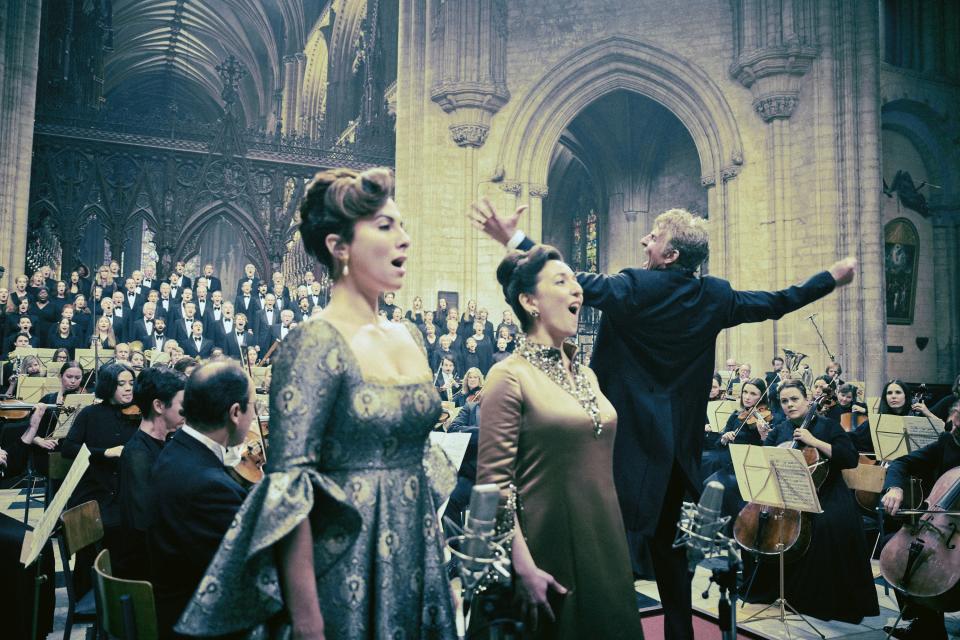
The scene in Maestro that had everyone talking is a vivid re-enactment of Bernstein’s legendary 1973 performance conducting Mahler’s “Resurrection” Symphony at Ely Cathedral in England.
Six years ago, while browsing through YouTube, Cooper came across director Humphrey Burton’s famous film of the concert that saw Bernstein joining with The London Symphony Orchestra. When it finally came time to make Maestro, he knew he would need a “pillar” of classical music to bolster it, and Mahler’s requiem came straight to mind.
“To me,” he says, “there’s nothing more powerful than the end of the ‘Resurrection,’ of any piece of music that I’ve ever heard. And then I found out where Burton’s film was shot, and I was like, ‘Oh, Ely Cathedral, I’ve got to go there.’ So, four and a half years ago, I went there. Luckily, somebody knew somebody, and they let me in at night, with my friend George, and we just walked around.” After that, he returned to the abbey several more times before they went there to scout for Maestro. He was adamant about shooting on the actual location for what would become a 6-minute-and-23-second scene.
Wouldn’t it have been more economical to have created the cathedral’s nave on a soundstage in the U.S.? “Well, Netflix certainly wanted us to,” says Cooper. “They were like, ‘Can’t you just shoot it with green screen?’” Luckily, Netflix caved and a couple of summers ago the production took over what felt like the whole town. “We just sort of took over and it changed back to the ’70s,” says Cooper.
Not only did he want to shoot on location, but he also wanted to shoot the sequence live. “On A Star is Born, I learned that if you do it live, the camera sees everything. It’s alive. But then I thought, ‘OK, but how the heck am I going to do it?’”
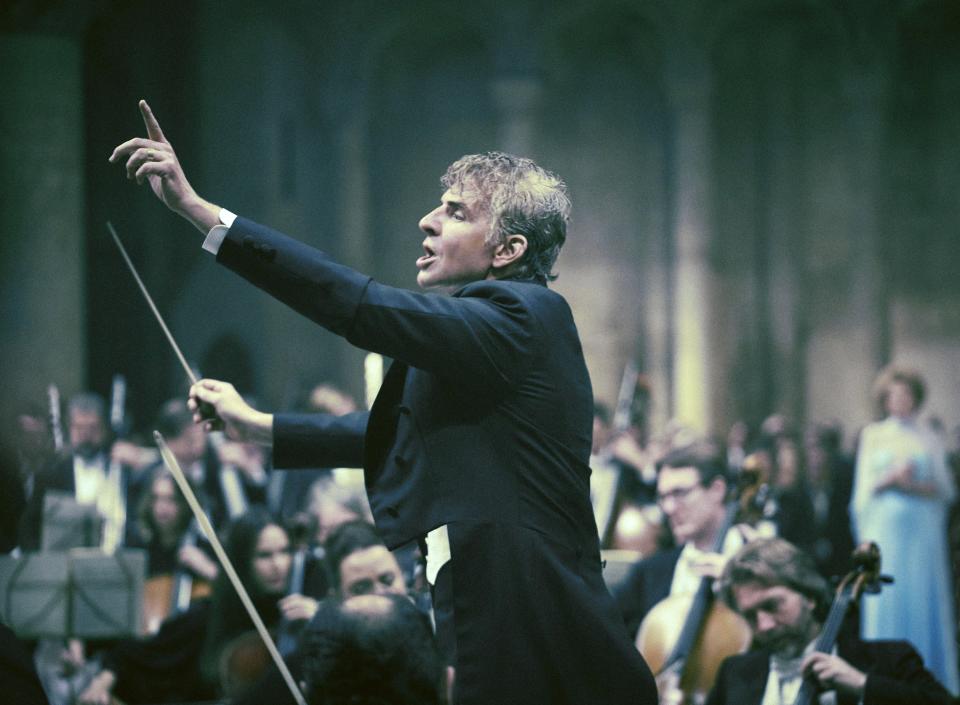
The answer was to surround himself with conductors like Gustavo Dudamel and Nézet-Séguin. Cooper crisscrossed the country following Dudamel, then over to Germany to be by his side as he rehearsed “Resurrection” with the Berlin Philharmonic.
In the meantime, Nézet-Séguin made him videos showing baton movements for the piece.
On the day of the shoot, he wore an earpiece, to help him count the tempo changes, though Cooper couldn’t hear them anyway, “because it was so f*cking loud. And I kept messing up the whole first day of shooting. I kept messing it up, and it was only the last take when I actually recomposed the whole shot, quite fearlessly. I knew I was scared going into that day, and the movie does not have a lot of cuts in it. I had seven setups just to get myself out of jail, so that I would at least have something I could cut together.”
That was Cooper thinking as the director. “But, as Lenny, I kept messing up every single take in front of the London Symphony Orchestra. In my head, I was like, ‘Oh my God, I just spent six years preparing for this and I’m f*cking it up. Everybody’s trusting me and I’m blowing it.”
Nézet-Séguin remembers it differently. By the end of the sessions at Ely, he says, the musicians of the L.S.O. were transported. “And you could see it on their faces,” he recalls. “Their faces were like, ‘Is that Bradley Cooper? Or is it really Lenny back?’ There was something eerie about the whole thing that was very moving for everyone. Because some of them had played under Lenny’s baton, and some of them knew someone who had been part of that performance in ’73. But they all recognized how miraculously he could really embody one of the most inspiring but also idiosyncratic conductors of all time.”
Nézet-Séguin emphasized the point that attempting “Resurrection” is not for the faint of heart. “It’s one of the biggest and most complex works of the repertoire. It’s difficult for an experienced conductor, so it was very impressive that he wanted to conduct this. But also very meaningful for the film.”
[When I later tell Cooper that Nézet-Séguin told me the musicians were understanding, and even impressed, Cooper is having none of it. “Well, it didn’t matter to me because I knew I was messing up and it killed me,” he snapped.]
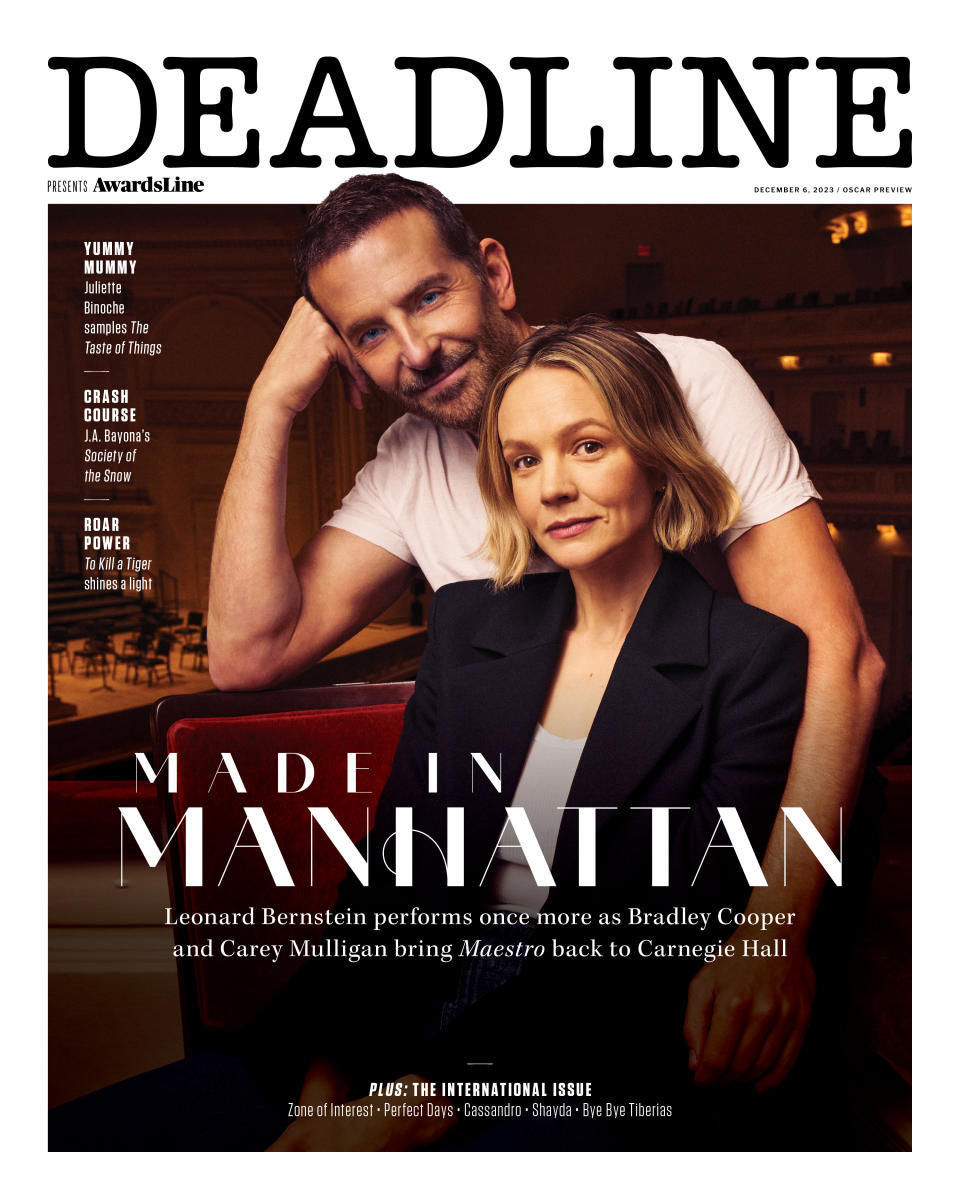
The following day, Cooper was in at the crack of dawn for make-up to turn him into old Lenny, and he had a little bit of quiet time to walk through the cathedral before anybody else got there.
“I had a conversation with Lenny,” he recalls. “I know that sounds crazy, but he said, ‘Just do one more.’ Now, we weren’t scheduled to shoot there that day. Theoretically, we’d already got the shot. We were supposed to shoot an exterior scene, a night-time driving scene with Felicia, which I didn’t end up putting in the movie.”
Instead, he asked 300 people to come back to Ely.
“I said a prayer, publicly, in front of everybody, thanking them and thanking Lenny. And then, for whatever reason, this time I was able to conduct them. I stayed on tempo. I knew everything that was happening, and I conducted them. And that’s what’s in the movie. It was one take.”
Mulligan’s role that day was to stand on one spot. She laughs. “There’s no other film where I’ve stood and stared at something for that long where I haven’t started thinking about my dinner. But I was standing there rooted to the spot, just watching him. And what’s so funny is that he talks about f*cking it up. Well, I had no idea he was f*cking it up. I just thought, ‘OK, so we’re doing it again.’ But there was no sense that he was f*cking it up. The only people who would have known if he was f*cking it up were him, Yannick, and the L.S.O. Everyone else in the room was like, ‘This is f*cking amazing.’”
Best of Deadline
2023 Premiere Dates For New & Returning Series On Broadcast, Cable & Streaming
2023-24 Awards Season Calendar - Dates For Oscars, Emmys, Grammys, Tonys, Guilds & More
Colman Domingo To Receive Palm Springs Film Festival's Spotlight Award, Actor
Sign up for Deadline's Newsletter. For the latest news, follow us on Facebook, Twitter, and Instagram.

